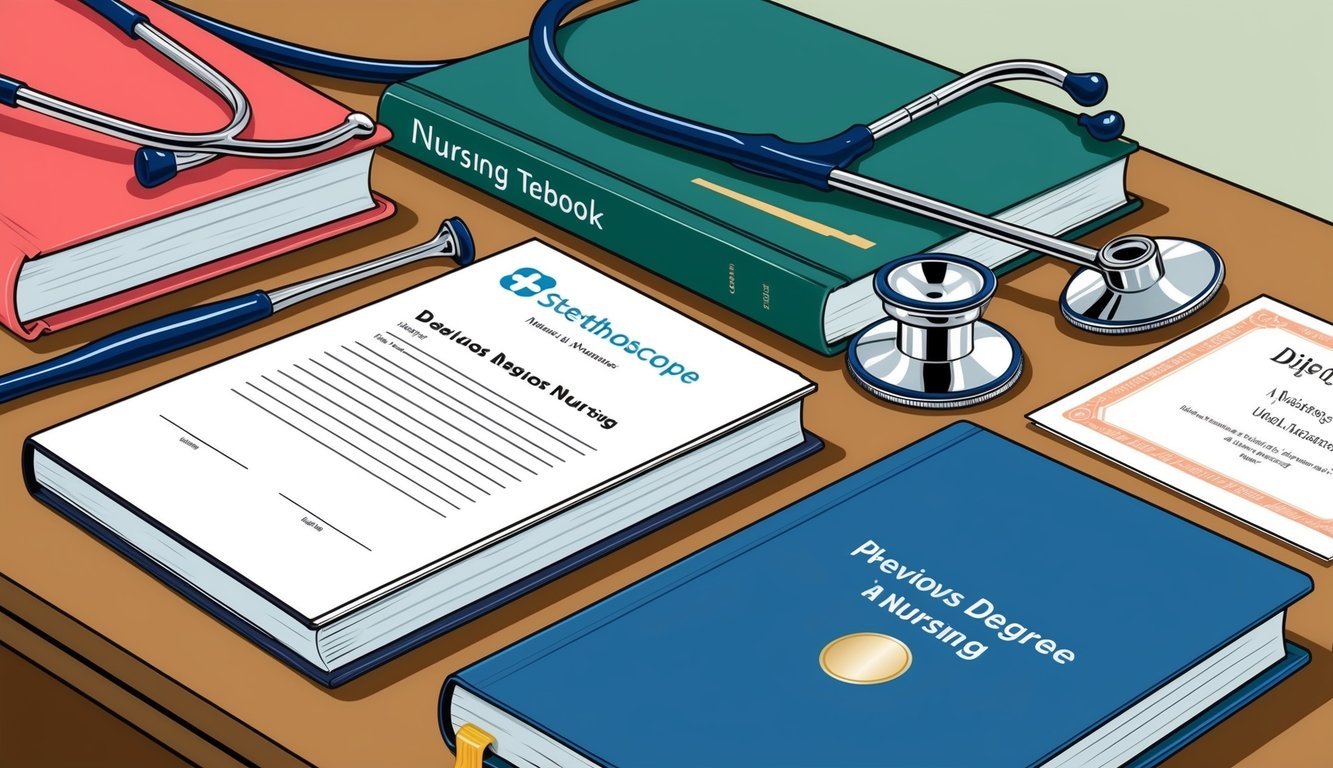A second-degree nursing program offers a quick and effective path for those looking to change careers and enter the nursing field. These accelerated nursing programs can help you earn your Bachelor of Science in Nursing (BSN) in as little as 14 to 18 months, allowing you to make a seamless transition into a rewarding profession. If you hold a bachelor’s degree in another field and want to become a registered nurse, this program could be the solution you need.
These programs focus on building your nursing knowledge and skills while leveraging your previous education.
The curriculum typically includes hands-on training, clinical experiences, and essential nursing coursework to prepare you for licensure and the challenges of a nursing career.
By enrolling in a second-degree nursing program, you can capitalize on the growing demand for nurses and explore various career opportunities in healthcare.
As you consider this exciting career change, it is important to understand the admission requirements, program structure, and potential career paths available upon graduation.
With the right program, you can embark on a fulfilling journey and make a significant impact in the lives of patients and communities.
Key Takeaways
- Accelerated programs can help you earn your BSN quickly.
- Admission criteria often include a previous bachelor’s degree.
- Graduates have various career opportunities in nursing.
Understanding Second-Degree Nursing Programs
Second-degree nursing programs offer a fast-track option for individuals who already hold a bachelor’s degree in another field.
They provide a structured pathway to becoming a registered nurse, usually through an Accelerated Bachelor of Science in Nursing (ABSN) program.
This section covers the main pathways and compares them to traditional nursing options.
Overview of BSN and ABSN Pathways
A Bachelor of Science in Nursing (BSN) program typically takes four years to complete, focusing on both nursing theory and clinical skills.
This degree prepares you for a range of nursing roles and enhances employment opportunities.
Accelerated BSN (ABSN) programs cater to those with a prior bachelor’s degree, allowing you to finish your nursing degree in as little as 12 to 18 months.
The ABSN format includes intensive coursework alongside clinical practice, making it a rigorous option.
The cost of ABSN programs can vary.
They often range from $30,000 to $120,000, depending on the institution and location.
For more on average costs, visit Nurse.org.
Comparison With Traditional Nursing Programs
Traditional nursing programs tend to have a slower pace and longer duration.
Typically, they include general education requirements, which can extend the time to graduation.
When comparing the ABSN to traditional programs, key points include:
| Feature | Traditional Nursing Programs | Accelerated BSN (ABSN) |
|---|---|---|
| Duration | 4 years | 12-18 months |
| Entry Requirements | High school diploma | Any bachelor’s degree |
| Course Load | Standard | Intensive |
| Clinical Practice Focus | Integrated throughout | Fast-paced clinical rotation |
Choosing between these options depends on your personal goals and timeline.
For further guidance, check out Nursejournal.
Admission Requirements and Prerequisites

To enter a second-degree nursing program, you must meet specific academic criteria and complete essential prerequisite courses.
These elements are crucial for gaining admission and preparing for the rigors of nursing education.
Academic Criteria
Most second-degree nursing programs require applicants to hold a bachelor’s degree in a non-nursing field.
This degree should ideally be from an accredited institution.
You will typically need a minimum GPA of 3.0, though some programs may have higher requirements.
Additionally, you may need to submit standardized test scores, such as the GRE, depending on the school you choose.
Key Academic Requirements:
| Requirement | Details |
|---|---|
| Degree | Non-nursing bachelor’s degree |
| GPA | Minimum of 3.0 |
| Standardized Tests (if required) | GRE or other tests |
Necessary Coursework Prior to Entry
Before applying, ensure you complete necessary prerequisite courses.
Common requirements include:
- Microbiology: A fundamental course that covers the study of microbes, essential for understanding infection and disease.
- Human Anatomy and Physiology: This coursework is crucial for nursing practice, as it provides insights into body systems and functions.
Schools may also require courses in chemistry and psychology.
Meeting these prerequisites strengthens your application and equips you with vital knowledge for your nursing studies.
Typical Prerequisite Courses:
| Course | Importance |
|---|---|
| Microbiology | Understanding of infections |
| Human Anatomy and Physiology | Basics of body systems |
| Chemistry | Essential for pharmacology |
| Psychology | Insights into patient behavior |
Program Structure and Curriculum
The program structure and curriculum of a second-degree nursing program are designed to provide you with the necessary knowledge and hands-on experience in a concise format.
These programs prioritize essential nursing coursework and clinical training to prepare you for a successful career in nursing.
Curricular Layout of ABSN Programs
Accelerated Bachelor of Science in Nursing (ABSN) programs typically span 12 to 18 months, depending on the institution.
The curriculum is demanding and focuses on core nursing concepts and practical skills.
You will engage in a mix of nursing coursework that covers subjects such as:
- Pharmacology
- Fundamentals of Nursing
- Health Assessment
- Pathophysiology
Many programs also incorporate online coursework, allowing flexibility in your studies.
This blended approach helps you balance your academic activities with your personal life.
Clinical Training and Academic Coursework
Clinical training is a vital part of your education.
Most programs include clinical placements where you apply your learning in real healthcare settings.
You will be assigned to various clinical environments, such as hospitals and clinics, to gain practical experience.
You will complete several clinical assignments that enhance your skills in patient care.
This hands-on approach fosters critical thinking and teamwork in medical settings.
Expect to complete 250 to 700 hours of clinical practice throughout your program.
This rigorous training prepares you for the responsibilities you will face as a registered nurse.
For more detailed information on specific ABSN programs, visit Nurse Journal and Rutgers Nursing.
Licensing and Accreditation
To enter the nursing profession, a solid understanding of licensing and accreditation is crucial.
These standards ensure that the education you receive meets industry requirements and that you are qualified to practice as a registered nurse.
Accreditation Standards
Accreditation is a process that verifies the quality of nursing programs.
Programs that meet specific criteria receive recognition from accrediting bodies, such as the Commission on Collegiate Nursing Education (CCNE).
When researching schools, look for CCNE-accredited programs.
This accreditation can impact your education’s quality and your employability.
Nursing programs generally need to meet rigorous standards that cover curriculum, faculty qualifications, and resources.
Accreditation also affects your eligibility for financial aid.
Federal loans and grants often require attendance at accredited institutions.
Key Points:
- Look for CCNE accreditation.
- Accreditation affects financial aid eligibility.
The Path to RN Licensure
After completing your nursing program, the next step is obtaining your RN license.
You must pass the National Council Licensure Examination (NCLEX-RN), which tests your knowledge and skills.
Schools often prepare students for the NCLEX-RN, and it’s crucial to aim for a school with a high NCLEX-RN pass rate.
This can indicate the effectiveness of their education.
The licensing process involves applying for your RN license through your state’s nursing board.
Requirements may vary, but generally, you’ll need:
- Graduation from an accredited program.
- Passing the NCLEX-RN.
- Meeting state-specific requirements.
Career Opportunities and Advancement
Choosing a second degree in nursing opens the door to many career paths.
You can explore various nursing specialties or pursue further education to elevate your practice.
Diverse Nursing Specialties
With a second degree in nursing, you can become a registered nurse (RN) and choose from numerous specialties.
Some popular options include:
| Specialty | Description |
|---|---|
| Pediatrics | Focuses on healthcare for children. |
| Geriatrics | Specializes in care for elderly patients. |
| Critical Care | Involves treating patients in life-threatening situations. |
| Telehealth Nursing | Provides care through virtual platforms. |
Each specialty offers unique challenges and rewards.
Finding the right fit enhances your career satisfaction and effectiveness in patient care.
As the healthcare field evolves, specialties like telehealth are growing, offering exciting opportunities for RNs.
You can explore options through resources like Nurse.org to find the path that suits you best.
Continued Education and Nurse Practitioners
Pursuing further education can lead to becoming a nurse practitioner (NP).
This role requires advanced training and education.
NPs can diagnose conditions, manage treatment plans, and prescribe medications.
To reach this level, you will need a master’s or doctoral degree.
Graduate study programs in nursing provide the knowledge and skills necessary to excel.
Many schools offer bridge programs specifically for those with a previous degree.
The investment in your education is valuable.
As an NP, you can work in various settings, including hospitals, clinics, and private practices.
This advancement not only increases your earning potential but also allows you to make a greater impact in patient care.
For more information, consider visiting Indeed for resources on nursing advancement opportunities.
Frequently Asked Questions

When considering a second-degree nursing program, you may have specific questions about prerequisites, program length, and available career opportunities.
This section addresses common concerns you might encounter as you explore your options.
What are the prerequisites for enrolling in a second-degree nursing program?
To enroll in a second-degree nursing program, you typically need a bachelor’s degree in a non-nursing field.
Most programs also require specific coursework, such as chemistry, biology, and anatomy.
Some programs may also ask for proof of healthcare experience or letters of recommendation.
How long does it typically take to complete an accelerated second-degree BSN program?
Accelerated second-degree BSN programs usually take about 12 to 24 months to complete.
Some schools offer intensive options that allow you to finish in as little as 12 to 15 months.
The programs are designed to cover the nursing curriculum at a faster pace compared to traditional pathways.
Are there any online second-degree BSN programs that offer flexibility for working adults?
Yes, some schools offer online or hybrid second-degree BSN programs for working adults.
These programs provide flexible scheduling and the ability to balance work and study.
Check specific universities like University of Houston for available options.
What career opportunities are available for graduates of second-degree nursing programs?
Graduates of second-degree nursing programs can work as registered nurses (RNs) in various settings, including hospitals, clinics, and community health organizations.
They may also specialize in areas like pediatrics, emergency care, or psychiatric nursing.
Advanced degrees can lead to roles such as nurse practitioner or nurse educator.
How do second-degree nursing programs differ from traditional four-year BSN programs?
Second-degree nursing programs are typically shorter and more intense, condensing coursework into a quicker timeframe.
In contrast, traditional BSN programs usually take four years and cover a broader range of subjects.
The focus is often on building clinical skills faster for those who already have a degree.
What factors should be considered when choosing a second-degree nursing program?
When selecting a program, consider factors such as accreditation, program length, cost, and location.
Look for schools with good NCLEX-RN pass rates and strong job placement services.
Also, evaluate the curriculum and support offered for students balancing other responsibilities.

